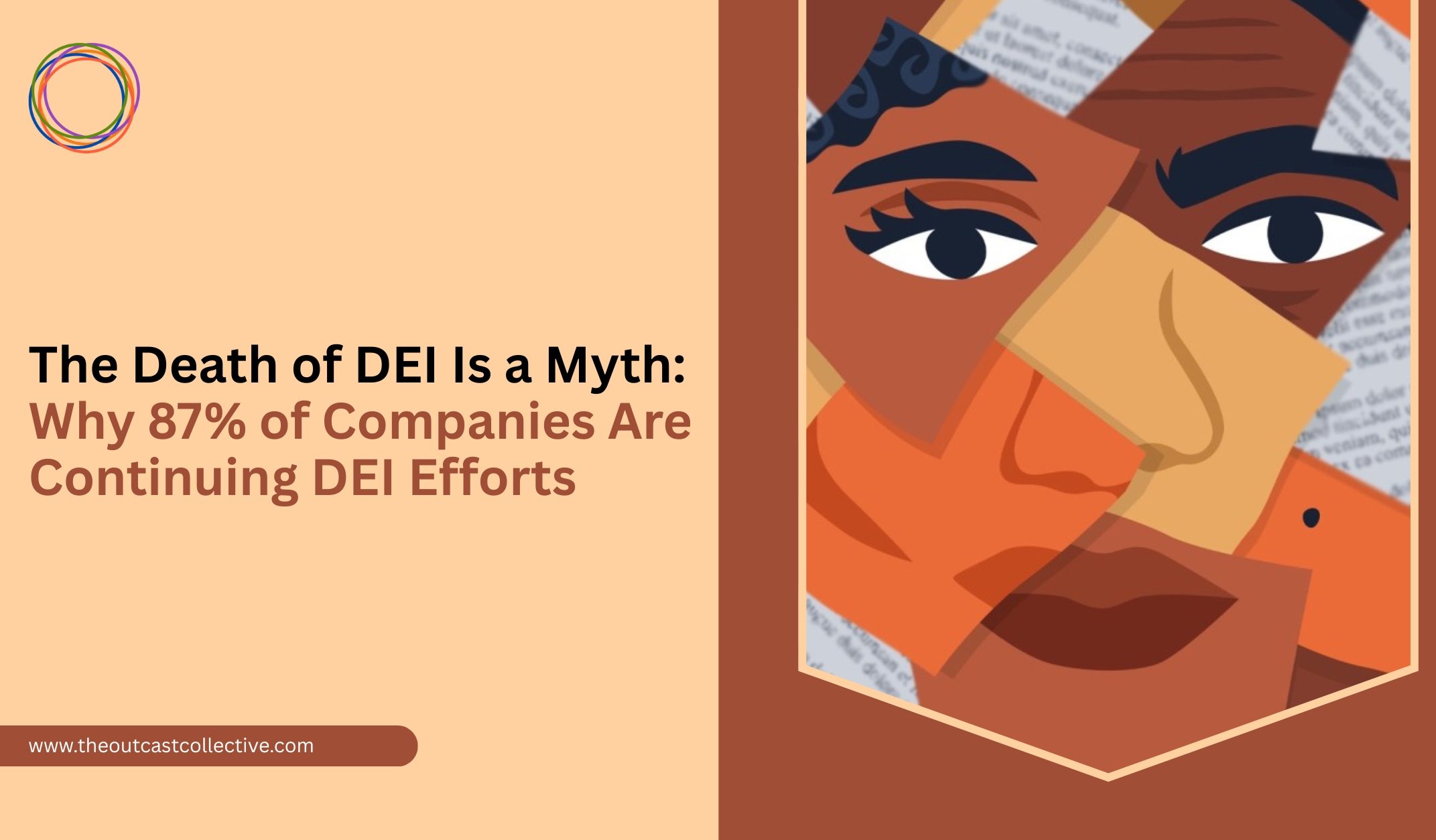May 13 2025 | theoutcastcollective
In recent months, the conversation around Diversity, Equity, and Inclusion (DEI) has intensified. Some critics have declared the end of DEI, citing political pushbacks and legal scrutiny as evidence that companies are retreating from their commitments. However, the numbers tell a different story—one that defies the narrative of DEI’s supposed demise.
87% of companies in the U.S. are either maintaining or increasing their DEI budgets in 2025.
According to a March 2025 survey by ResumeBuilder.com, nearly 9 out of 10 companies have not only sustained their DEI investments but are actively expanding them. This data is a testament to the evolving nature of DEI, moving from isolated initiatives to integral parts of business strategies. Patricia L. Glaser, a prominent civil rights attorney, stated in an interview, “The notion that DEI is fading is misleading. Companies are not stepping back—they are stepping up, becoming more strategic and intentional.”
DEI Is Shifting—Not Shrinking
The evolving political and legal landscape has led some organizations to rebrand their DEI efforts—not abandon them. A recent Gartner HR Report (2025) revealed that 63% of HR leaders are expanding DEI metrics to better measure impact, rather than scaling back initiatives. This adjustment reflects strategic shifts to navigate political headwinds while maintaining core DEI principles.
Take Goldman Sachs as an example. The organization recently rebranded its “One Million Black Women” initiative to “One Million Women in Communities.” While critics called it a retreat, the fundamental mission to close opportunity gaps remains intact. Similarly, companies like McDonald’s and Starbucks have reframed public narratives while doubling down on internal DEI commitments.
“Our commitment to DEI is not a moment; it’s a movement,” said Chris Kempczinski, CEO of McDonald’s. “We are embedding inclusion into every part of our operations—from the boardroom to our frontlines.”
“When inclusion is authentic, it transcends compliance; it becomes a business advantage,” stated Tiffany Dufu, Founder and CEO of The Cru.
Corporate Leaders Are Doubling Down
DEI has not been abandoned by leadership. In fact, it is being championed more vocally than ever.
When Marriott International’s CEO Anthony Capuano reaffirmed the company’s commitment to DEI, he received over 40,000 emails of support. He noted:
“DEI is not just a business imperative—it’s a moral one. Our people and our guests come from every walk of life, and our culture must reflect that diversity.”
Similarly, Barclays CEO C.S. Venkatakrishnan reinforced the company’s commitment, saying:
“We remain fully committed to building a workforce that reflects the communities we serve. Adjusting goals does not mean abandoning values.”
“To walk away from DEI now is to walk away from progress,” asserted Mary Barra, CEO of General Motors.
These statements reflect a broader trend—DEI is not just surviving; it’s evolving under strategic leadership.
Why DEI Still Makes Business Sense
The business case for DEI remains indisputable:
- 36% more likely to have above-average profitability – McKinsey (2024)
- 87% better business decisions with inclusive teams – Deloitte (2025)
- 19% higher innovation revenues with diverse leadership – BCG (2025)
“Inclusion drives innovation. The companies that embrace diversity now are the ones that will win tomorrow,” said Rosalind Brewer, former CEO of Walgreens Boots Alliance.
“When people feel like they belong, they give their best. It’s not just good for business; it’s essential for growth,” added Indra Nooyi, former Chairperson and CEO of PepsiCo.
What’s Really Happening? Rebranding, Not Reversing
Companies are reframing DEI initiatives with new language: “belonging,” “equity-centered performance,” and “inclusive leadership.” These shifts are not signs of decline—they are markers of deeper integration into corporate strategy.
“We’re not stepping back; we’re stepping forward with more intention and strategy,” remarked Brian Chesky, CEO of Airbnb.
At The Outcast Collective, We See It Every Day
As inclusion strategists, we partner with global organizations across various sectors—retail, finance, technology, and manufacturing. What we see is not a withdrawal but a recalibration. Organizations are investing in inclusive hiring, mental health equity, disability inclusion, and leadership development for marginalized communities.
The companies that succeed are those that understand this fundamental truth: DEI is not a checkbox—it’s a competitive advantage.
Final Thoughts: DEI Is Not Dead—It’s Evolving
While the narrative of DEI’s decline makes headlines, the real story is one of adaptation and resilience. 87% of companies are still committed, leaders are speaking up, and DEI is evolving into a more robust, strategic component of business.
It’s not the death of DEI—it’s the next evolution.
Take the first step today. Schedule an exploratory consultation via WhatsApp at +91-9372177748 or email lakshmi@theoutcastcollective.com with our DEI experts and start building a workplace where everyone belongs.
